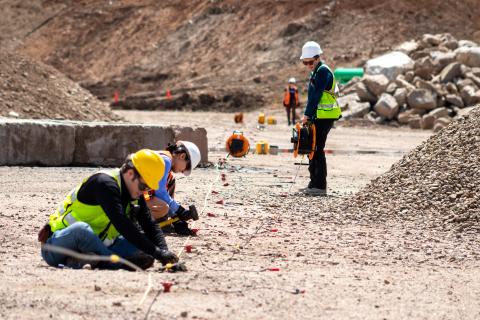All Categories
Featured
Table of Contents
Geoscience, Geophysics Option, in Dianella Oz 2022
Link with MBA programs seeking prospects like you. Research study. Connect with master's programs around the country to get an edge over the competitors.

A geophysicist studies numerous aspects of the earth. According to the U.S. Geological Survey, they study gravity, magnetic, electrical, and seismic activity occurrences. Geophysicists likewise document, assess, and take measurements of geographic features and anomalies. View a video to discover what a geophysicist: Geophysicists need to make a minimum of a bachelor's degree; however, this is for an entry-level position.
If you want do research you need to pursue a Ph. D. Undergrad coursework typically consists of geology, mathematics, ecological science, or physics. Advanced degrees need more particular studies in the specialty of option. Areas can consist of oceanography, climatic physics, meteorology, planetary, petroleum, ecological, and mining. Task potential customers are greater if you have a strong background in computer science or technology.
What Is A Seismic Survey? in Alexander Heights Western Australia 2020
Access to these opportunities might be restricted depending upon where you live; nevertheless, internships or summertime programs with geophysical companies, university geophysics department, or the U.S. Geological Study can be options. You can find a list of a list of chances on the United States Geological Survey (USGS) websites' Pathway Programs tab (opens in another link).
If you have yet to graduate high school, taking as numerous science and math classes as possible would be a plus. Geophysicists also work with computers while researching, so computer system courses can also be useful, as mentioned previously in this article. Lots of geophysicists focus on an area of geophysics. The task description would change pending on the specialized.
A geophysicist's duties can consist of determining, tracking, and documenting data from various physical properties on earth. Geophysicists often have to travel worldwide to analyze geological occasions that have happened or might have been predicted.
Geophysicist - Job Role - Job Information in Armadale Aus 2023
Jay Wellik, a geophysicist, research studies volcanos. Geophysicists generally work full-time hours; however, they typically work irregular hours, as mentioned previously.

You can find additional information about Geophysicists in addition to extra academic products on the U.S. Geological Study site (links open in a brand-new window). Laura Stern, of the U.S. Geological Study at the Gas Hydrates Lab in Menlo Park, California: We make a variety of different hydrates in the lab.
We also make co2 hydrate, ethane hydrate, propane, a variety of various structures. Liquid nitrogen is extremely cold. It has to do with 100 degrees cooler than the temperature level at which these hydrate samples would dissociate, when they would disintegrate to ice plus gas on the tabletop. In here we have a little piece of methane hydrate.
Geophysicist Job Description: Salary, Duties, & More in Boya Aus 2020
So the samples we make, their polycrystalline. They appear like snow, it appears like compacted snow however truthfully, it does include gas inside. Take a little piece off here and as it heats up, you'll begin to see it pop. It's reverting to ice plus gas and after that as the ice would melt as it continues to warm, it will wind up being water plus gas.
My name is Steve Kirby, I'm a Geophysicist here at the U.S. Geological Study in Menlo Park. I work with Laura Stern who is also a Geophysicist in this lab that is dedicated towards the examination of planetary ices and gas hydrates. Gas hydrates in nature happen in extremely remote locations and they are really intricate with the interactions and conditions that they form under and samples that are raised are under some sort of alternation or decomposition.
This is an uncommon laboratory and there are just a handful of them worldwide and we are extremely fortunate to be here at the Geological Survey and to have the opportunity of working on them. Bureau of Labor Statistics, U.S. Department of Labor, Occupational Outlook Handbook, Geoscientists. National Center for O * NET Development.
How To Become A Geophysicist in Kelmscott Western Australia 2021
This video was produced by the federal government for the U.S. Geological Survey. The USGS Gas Hydrates Laboratory is funded by the Department of Energy and the USGS Gas Hydrates Job.
Latest Posts
Geophysical Survey in Jandakot Australia 2020
Geophysics Definition & Meaning in Roleystone Oz 2021
Geophysical Survey - Explore The Seafloor in Kinross WA 2021